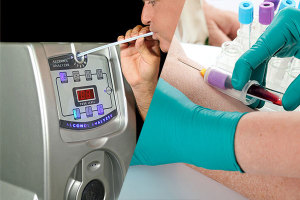DUI Blood Testing a Persons Intoxication
The degree of a person’s intoxication is determined by the concentration of alcohol in the brain. It only follows, then, that DUI testing would use a sample of brain tissue as the ideal substance to test for evidence of intoxication. Unfortunately, a sample of brain tissue cannot be obtained without killing or seriously injuring the person being tested. Therefore, a chemical test that directly measures the concentration of alcohol in a person’s brain is impossible to perform, at least on a living person. Of the many indirect methods of determining the concentration of alcohol in brain tissue, the most accurate and reliable method is that of measuring the concentration of alcohol in the blood. Because the brain is bathed in blood and because it is the blood that carries alcohol to and from the brain, a direct relationship exists between the concentration of alcohol in the blood and brain tissue. DUI blood testing, therefore, is but one step removed from the direct testing of brain tissue. Because of the direct relationship that exists between the concentration of alcohol in blood and brain tissue, the universal standard for measuring the degree of intoxication is blood alcohol concentration or BAC. BAC is usually expressed either in terms of grams of alcohol per 100 milliliters of blood or, more often, as a percentage. For example, to be presumed intoxicated, a person must usually have a BAC of .10 grams of alcohol per 100 milliliters of blood or, as it is more often expressed, a BAC of .10 percent. So universal is the concept of BAC that even when alcohol is measured in substances such as breath or urine, the test results are usually expressed in terms of BAC. In practice, it is often either impossible or impracticable to obtain a sample for DUI blood testing. In many states, a blood test may not be administered over the objection of the person being tested, who may specify another method of testing without violating the implied consent law. Further, most drinking-driving laws require a blood sample to be drawn by a physician, registered nurse, or another qualified person, none of whom is likely to be present at the police station when a drinking-driving suspect is brought in for testing.

For these and other reasons, tests other than DUI blood tests are usually favored by law enforcement officials. The test of choice of the law enforcement establishment is the breath test, which is by far the most widely used method of chemical testing in drinking-driving cases. DUI blood tests and urine tests are usually given only when it is not feasible to administer a breath test.
Breath and urine tests, it should be understood, are but indirect methods of measuring blood alcohol concentration, which is itself an indirect method of measuring the concentration of alcohol in the brain. Thus, a breath or urine test is a double indirect measurement of the concentration of alcohol in the brain and is, therefore, a double indirect measurement of a person’s degree of intoxication.
A chemical test can serve either of two functions: it can identify the substances present in the sample being tested, or it can determine the amount of a particular substance that is present in the sample. A test fulfilling the first function is referred to as a qualitative test, while a test fulfilling the second function is called a quantitative test. Because the purpose of chemical testing for alcohol in drinking-driving cases is to determine the amount of alcohol present in the sample being tested, the tests performed are primarily quantitative, although they often have some qualitative aspects. Only rarely, such as when the presence of a substance that may affect the result of the quantitative test for alcohol is suspected, is a purely qualitative test used in alcohol testing.
Not surprisingly, there are several different types of quantitative chemical tests for alcohol that are used in drinking-driving cases. Regardless of the type of chemical test, however, three fundamental scientific principles of testing must be complied with for a test result to be accurate and reliable. These fundamental principles of chemical testing apply equally to tests performed on blood, breath, or urine samples. If these fundamental principles have not complied with the performance of a test, the test results cannot be accurate and reliable, regardless of how carefully or precisely the test is performed.
The three most common tests to determine blood alcohol levels are blood, breath, and urine.
Related Articles
Summary of DUI Defenses
The Legality of the Stop
Articulable Suspicion
Ways to WIN or Reduce Your DUI Case
Contact Us
For a FREE Case Evaluation with a specialized DUI-DWI attorney near me to discuss our legal services, call or submit your case details. We are available 24 hours/7 days a week.
1-844-TEAM-DUI (1-844-832-6384)Find a DUI lawyer near you – click on your state.
Copyright 2025. William C. Head. All Rights Reserved.